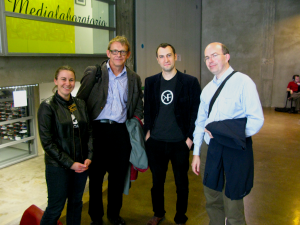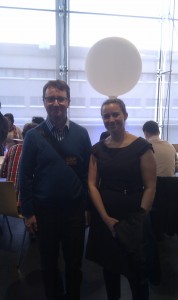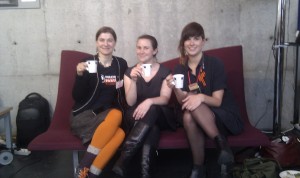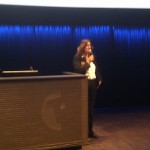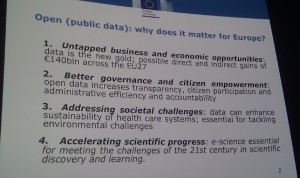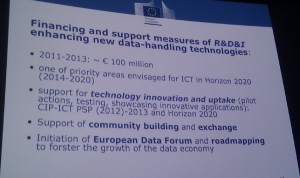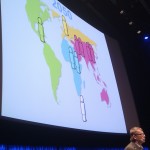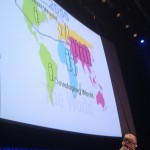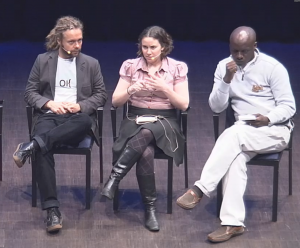Recently I spoke on a panel at the NSW Information Commissioner’s “Creating Open Government” forum about my thoughts on blue sky ideas in this space. I decided to work on the assumption of the importance and need for creating open government for a digital society. In the 10 mins I had, I spoke on the pillars of public engagement, citizen centric services and open data, where we need to go in the open government movement, and a few other areas that I believe are vital in creating open government.
Below are some of the thoughts presented (in extended form), some cursory notes, and some promises to write more in the coming months 🙂
I should say up front that I am a person who believes government has an important role to play in society, even in a highly connected, digitally engaged and empowered society. Government, done right, gives us the capacity to support a reasonable quality of life across the entire society, reduce suffering and provide infrastructure and tools to all people so we can, dare I say it, live long and prosper. All people are not equal, there is a lot of diversity in the perspectives, skills, education, motivation and general capability throughout society. But all people deserve the opportunities in their life to persue dignity, happiness and liberty. I believe government, done right, facilitates that.
In my mind government provides a way to scale infrastructure and services to support individuals to thrive, whatever the circumstancecs of their birth, and facilitate a reasonably egalitarian society – as much as can be realistically achieved anyway. I’m very glad to live in a country where we broadly accept the value of public infrastructure and services.
So below are some thoughts on next steps in creating open government, with additional references and reading available 🙂
1) Online Public Engagement
There is generally a lot of movement to engage online by the public sector across all spheres of government in Australia. However, this tends to be the domain of media and comms teams, which means the engagement is often more about messaging and trying to represent/push the official narrative. There are a lot of people working in this space who say they are not senior enough to have a public profile or to engage publicly without approval and yet, we have many people in government customer support roles who engage with the public every day as part of their job.
I contend that we need to start thinking about social media and “public engagement” also as a form of customer support, and not just media and communications. In this way, public servants can engage online within their professional capacities and not have to have every tweet or comment vetted, in the same way that every statement uttered by a customer service officer is not pre-approved. In this way interactions with citizens become of higher value to the citizen, and social media becomes another service delivery mechanism.
For example, consider how many ISPs are on social media, monitoring mentions of them, responding with actual customer support and service that often positively impacts that persons experience (and by extension community perception) of the organisation. Government needs to be out there, where people are, engaged in the public narrative and responsive to the needs of our community. We need our finger on the pulse so we can better respond to new challenges and opportunities facing government and the broader community.
One of the main challenges we face is the perception from many people that there is little be gained through public engagement. If a department or agency embarks upon a public consultation without genuinely being interested in the outcomes, this is blindingly obvious to participants, and is met with disdain. It is vital that government invest in online community development skills and empower individuals throughout the public service to engage online in the context of their professional roles.
This online engagement development skillset can be deployed for specific consultations or initiatives, but it also vital on an ongoing basis to maintain a constructive narrative, tone and community that contributes on an ongoing basis.
Further reading:
2) Citizen Centric Services
Citizens don’t care about the complexities of government, and yet we continue to do service delivery along departmental lines and spheres of government. The public service structure is continually changing to match the priorities of the government of the day, so not only is it confusing, but it is everchanging and we end up spending a lot of effort changing websites, stationery and frontline branding each portfolio shuffle. The service delivery itself (usually) continues seamlessly regardless of shifts in structure, but it is hard for citizens to keep up, and nor should they be expected to.
Citizen centric services is about having a thematic and personalised approach to service and information delivery. Done well, this enables a large number of our population to self service, in the manner and at the time that is convenient to them. It is no small task to achieve as it requires a way to integrate (or perhaps sit in between) systems and data sources throughout all of government, but we have some established case studies in Australia that we can learn from. Rather than trying to get consistent systems across government – which leads to always being only as strong as your weakest link – it is feasible to have integration tools to “front end” government.
By enabling many citizens to effectively self service, this approach also frees up government resources for supporting our most vulnerable and complex cases.
It is worth also noting that a truly citizen centric approach would be both cross departmental *and* cross jurisdictional. We need to start asking and addressing the challenges around how can we collaborate across the three spheres of government to give citizens a seamless experience?
A more eloquent description of this concept is from a speech from my former boss, Minister Kate Lundy, from a speech entitled Citizen-centric services: A necessary principle for achieving genuine open government/
3) Proactive data disclosure – open data and APIs
The public service holds and creates a lot of data in the process of doing our job. By making data appropriately publicly available there are better opportunies for public scrutiny and engagement in democracy and with government in a way that is focused on actual policy outcomes, rather than through the narrow aperture of politics or the media. This also builds trust, leads to a better informed public, and gives the public service an opportunity to leverage the skills, knowledge and efforts of the broader community like never before.
Whether it be a consultation on service planning or a GovHack, an open and contextualised approach to data and indeed the co-production of policy and planning ends up being a mechanism to achieve the most evidence based, “peer reviewed” and concensus driven outcomes for government and the community. It gets citizens directly engaged in actual policy and planning, and although the last word is always ultimately with the relevant Minister, it means that where political goals don’t align with the evidence based policy recommendations, an important discussion can be had and questions asked from an engaged and informed public.
This, to me, is a real and practical form democracy. I feel that party politics actually gets in the way to some degree, as it turns people off engaging in the most important institute in their lives. Like a high stakes team sport, the players are focused on scoring goals against their opponents and forget about what is happening off field.
As a person who is working in the public service, I truly believe that transparency is our best defence in fulfilling our duty to serve the public.
With major changes to legislation in recent years making FOI more seamless and accessible to citizens, departments are struggling to allocate necessary resources to comply in an extremely fiscally conservative environment.
In the meantime, although there is a general concensus on the value (with admittedly sometimes quite different interpretations of value) of opening up more public sector information publicly, the fact is that it is largely seen as a “good” thing to do, a nice to have, and as such has been challenging for departments to justify the not-insignificant resources required to move to a proactive data disclosure status quo.
There is a decent argument to say that proactively publishing data (and indeed, reports) would help mitigate the rising costs of FOI as departments could point requests to where the information is already online. But realistically, unless the department had in place the systems to automate proactive publishing, then it will remain something done after the fact, not integrated into business as usual, ad hoc and an ongoing expense that is too easily dropped when the budget belt tightens.
I have people say to me all the time “just publish the data, it’s easy”. The funny thing is the vast majority of people have little to no experience actually doing open data in government. It is quite a new area and though the expertise is growing, we are in infancy stages in jurisdictions around the world. Even some jurisdictions with very large numbers of data sets are doing much of that work manually, the data becoming out of date quickly, and quite often the pressure to be seen to do open data overrides the quality and usefulness of the implementation, as we see datasets being broken down into multiple uploads to meet quantitative KPIs.
The truth is, although putting up some datasets here or there is relatively easy – there is a lot of low hanging fruit – to move to a sustainable, effective, automated and systematic approach to open data is much harder, but is the necessary step if we are to see real value from open data, and if we are to see the goals of open data and mitigating FOI cost compliance merge.
Interestingly, another major benefit of the proactive public publishing of government data, is that the process of ensuring a dataset complies with privacy and other obligations is quite similar between making something public and sharing across departments at all. By making more government data openly available, particularly when combined with some analysis and visualisation tools, we will be able to share data across departments in an appropriate way that helps us all have better information to inform policy and planning.
The good news is, in Australia we have the policies (OAIC, AG Principles of IP, Ahead of the Game, Gov 2.0 Taskforce Report, etc), legislative (FOI changes),and political cover (Declaration of Open Government, though more would be useful) to move on this.
I will be doing a follow up blog post about this topic specifically in the coming week after I attend a global open data conference where I intend on researching exactly how other jurisdictions are doing it, their processes, resourcing, automation and procurement requirements. I will also give some insights to what the dataACT team have learnt in implementing Australia’s first actual open data platform, which is an important next step for Australia building on the good work of AGIMO with the data.gov.au pilot.
Additional notes:
- more effective and efficient government – shared across departments, capacity to have whole of gov business intelligence and strategic planning, capacity to identify trends, opportunities and challenges within public service
- internal measuring, monitoring, reporting and analysis – government dashboards – both internal and public reporting on projects
- innovation – public and private innovation through access to data, service APIs – gov can build on public innovation for better service delivery – eg GovHack
- transparency – need to build trust, what is the value to gov? – eg of minister vs doctor example
4) Agile iterative policy
There is a whole discussion to have about next generation approaches to policy which would be iterative, agile, include actual governance to keep the policy live and responsive to changing circumstances, and the value of live measuring, monitoring and analysis tools around projects and policies to help with more effective implementation on an ongoing basis and to applying the learning from implementation back into the policy.
The basic problem we have in achieving this approach is that, structurally, there is generally no one looking at policy from an end to end perspective. The policy makers are motivated to complete and hand over a policy. The policy implementers are motivated to do what they are handed. We need to bridge this gap between policy makers and doers in government to have a more holistic approach that can apply the lessons learnt from doers into strategic planning and development on an ongoing basis.
I’ll further address this in a followup blog post next month as I’m pulling together some schools of thought on this at the moment.
Check out the APS Policy Visualisation Network which is meeting for the first time next week if this space interests you. It will be fascinating to have people across the APS discussing new and interesting approaches to policy, and hopefully we will see the build up of new skills and approaches in this area.
Notes:
- iterative and adaptive policy – gone are the days of a static 10 year policy, we need to be feeding recommendations from testing, monitoring, measuring back into improving the policy on an ongoing basis.
- datavis for policy “load testing”, gleaning new knowledge, better communication of ideas, visualisation networks for contextualisation, etc
- co-production, co-design
- evidence based, peer reviewed policy that draws on the diverse strengths throoughout our community and public service
5) Supporting Digital industries
There are many reasons why, as a society we need to have strong digital industries including IT, creative, cultural, games development, media, music, film and much more. Fundamentally these industries and skills underpin our success in all other industries to some extent, but also, we have seen many Australian digital companies have to go overseas to survive, and we need to look at the local market and environment and ask how we can support these companies to thrive in Australia.
I ran two major consultations about this over the past couple of years, and the outcomes and contributions are still very relevant:
- The ICT and Creative Industries Public Sphere – included an excellent contribution paper from Silicon Beach, a group of Australian tech entrepreneurs who have exceptional insights to the sectors here and overseas.
- The Digital Culture Public Sphere – included excellent contributions from the games development industry, digital arts, the digital culture (GLAM) sector and much more.
Notes:
- Open government can contribute to our digital sector through:
- open data – esp cultural content for which we are custodians and esp the large quantity of data which is out of copyright
- being great users of and contributers to digital technologies and the Australian sector
- focused industry development strategies and funding for digital sectors
6) Emerging Technologies
I finished my panel comments by reflecting on some emerging technologies that governments need to be aware of in our planning for the future.
These are just some new technologies that will present new opportunities for government and society:
- 3D printing and nanotechnology – already we have seen the first 3D printed heart which was successfully transplanted.
- Augmented Reality
- Wearable computing and “body hacking”
On the topic of 3D printing, I would like to make a bold statement. You see, at the moment people are already trying to lobby against 3D printing on the basis that it would disrupt current business models. Many on the technology side of the argument try to soften the debate by saying it is early days, you don’t get perfect copies, and myriad other placations. So here it is.
3D printing will disrupt the copyright industry, but it will also disrupt poverty and hunger. As a society, we need to decide which we care about more.
There is no softly softly beating around the bush. There are some hard decisions and premises that need to be challenged, otherwise we will maintain the status quo without having even been aware of an alternative.
With advancements in nanotechnology also looming, we could see perfect copies of pretty much anything, constructed atom by atom out of waste for instance.
But there are also many existing technologies that can be better utilised:
- games development – we have some of the most highly skilled games developers in the world and we can apply these skills to serious issues for highly citizen centric and engaging outcomes.
- cloud – current buzzword – presents some good opportunities but also a jurisdictional nightmare so tread very carefully. You need to assume anything in the “cloud” can disappear or be read by anyone in the world
- social media – see point 1
7) Final comment on government, power and society
Finally, just a couple of words about the most important element in creating open governments that can service the needs of an increasingly digital society.
We need to dramatically shift out thinking about technology and what it means to government. An no I don’t mean just getting a social media strategy.
For anything we think, plan, strategise, hypothesise or talk about to become real, we inevitably use a number of technologies.
Most people treat technology like a magic wand that can materialise whatever we dream up, and the nicely workshopped visions of our grand leaders are generally just handballed to the bowels of the organisation, otherwise known as the IT department, to unquestionably implement as best they can.
Technology, and technologists, are seen to be extremely important in the rhetoric, but treated like a cost centre in practise with ever increasing pressure to do more with less, “but could you just support my new iPad please?” IT Managers are forced to make technology procurement decisions based on which side of the ledger the organisation can support today, and the fiscal pressures translate to time pressures which leaves no space for meaningful innovation or collaboration.
We need the leaders of government, especially throughout the public service to be comfortable with and indeed well informed about technology.
We need collaborative technologists in the strategic development process, as we are the best people positioned to identify new opportunities and to help make a strategic vision that has a chance of seeing daylight.
We need to stop using the excuse that innovation or open government “isn’t about technology”, and recognise that as a government, and as a society, need to engage a healthy balance of skills across our entire community to co-design the future of government together. And we need to recognise that if we don’t have technologists in that mix, then all our best intentions and visions will simply not translate into reality.
Monitor, measure, analyse, collaborate, co-design, and be transparent.
The future is here, it simply isn’t widely distributed yet – William Gibson
Notes from after my speech from the event
The NSW AG speech was excellent – he spoke about the primary difference between the NSW Government Information (Public Access) Act 2009 and the old approach is that the current approach pushes for proactive disclosure.
He mentioned three significant aspects of GIPA:
- Accessibility
- Manner in which is enables participation
- Public right to know is paramount
There was an important comment from the day that we need to address sustainable power if we are to build a vision for the future.
There was comment on public interest – public consultation, get best inputs, peer review, chose most evidence based approach.
Questions about cloud:
- Cloud attributes – jurisdiction, privacy, ownership, enforcability of contract, data transportability
- Functional categorisation – private data? criticality of data/service delivery?
- PATRIOT Act implications
AGIMO have some good policy advice in this area worth looking at on their Cloud computing page.
I wrote a hopefully useful post on this a while back called Cloud computing: finding the silver lining. I will be following that up with some work I’m doing in gov atm around this topic a little later, looking at the specific attributes of cloud services, how they map to different things gov want to do, and the fact that government jurisdictions around the world are pretty much universally using what I call “jurisdictional cloud” services, which means they are hosted by gov, or by gov owned entities within their legal jurisdiction. The broad calls for government to “just go cloud” suggest a binary approach of ‘to cloud or not to cloud’ which is simply not reality, not a reasonable thing to expect when government has obligations around privacy, security, sovereignty, ensuring SLAs for service delivery to citizens, and much more.
I also did an interview with Vivek Kundra (prior CTO for US Federal Gov) a while back which will be useful to a lot of people.
I loved the five verbs of Open Gov by Allison Hornery: Start, Share, Solve, Sync, Shout. Her speech was great!
Also, Martin Stewart-Weeks talked about three principles of open government:
- partly in cathedrals and partly in bazaars
- new relationships between institutions and communities, and
- knowledge has become the network. Great presentation and interesting how open source ideas are so prolific in this space.
